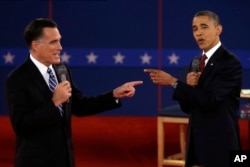Intrigue and drama surrounding Donald Trump's tax returns underscore America's curiosity about financial documents that have been made public by every major party presidential candidate, other than Trump, since 1976.
"American voters get to know their presidential candidates, ever so slightly more, through their tax returns," said political analyst John Hudak of the Washington-based Brookings Institution. "They let voters know how much they earn, where those earnings come from, and offer some insight into the types of business dealings a candidate has."
President Barack Obama has released every tax return during his presidency, showing income ranging from $447,000 to $5.6 million.
His 2007 federal tax return, filed in 2008 when he was campaigning for the White House, showed that he and wife Michele Obama had a total income of $4.2 million, much of which came from sales of books he authored.
Obama's opponent that year, Republican Senator John McCain, released a tax return showing $400,000 in total income.
In this year's presidential race, Democratic nominee Hillary Clinton released tax returns showing a total income of $10.7 million in 2015, earned with her husband, former President Bill Clinton.
Republican nominee Trump has released no tax documents, although a portion of what are believed to be his 1995 state tax returns were published recently by The New York Times, which received the forms anonymously. Those documents show Trump lost more than $900 million in an assortment of business ventures that year, an amount that may have allowed him to legally avoid paying any federal income taxes for nearly two decades afterward.
"No one seeking federal office is required to release their tax returns. Release of returns is completely voluntary," said Jeremy Scott of Tax Analysts, a nonpartisan policy group outside Washington.
Learning from tax returns
"Voters can learn about a candidate's income and effective tax rates [from tax returns]. Voters can also learn about a candidate's charitable giving, which is usually closely scrutinized," Scott said, cautioning that tax returns, however, can paint an incomplete picture of a filer's financial dealings, particularly when it comes to a real estate mogul like Trump.
"What voters can't learn about is a candidate's overall wealth or all of the deals or business entities they might be involved in,” Scott said. “Donald Trump's tax returns would probably paint a very inaccurate picture of his overall financial situation because Trump probably will not have much income, maybe none at all given the [recent] Times story. … But he could have considerable assets — real estate, the value of his brand — that wouldn't necessarily show up on a tax return."
Allan Lichtman, a political historian at American University in Washington, said the tax returns give American voters insight into a candidate's actual financial history.
"Americans care about tax returns because they provide a glimpse into what a candidate has actually done in the crucial areas of business and finance, rather than what they have said," Lichtman said. "Voters want to see if candidates have paid their fair share of taxes, how much they have contributed to charity, whether they have used tax loopholes to avoid paying taxes, and how their business practices and income square with their public comments.
"Any candidate who broke the tradition of some four decades and refused to release taxes would face some blowback. However, the blowback is especially severe for Trump because he is running under the banner of his expertise as a businessman and claims to have built a business empire of many billions of dollars," he added.
In 2012, Hudak noted, "[Republican presidential nominee Mitt] Romney dragged his feet in producing his returns and ultimately faced tremendous media criticism and public outrage over failure to do so. Unlike Trump, Romney eventually relented."
Once released, Romney's 2011 tax return showed a total income of $13.7 million, nearly all of which came from investments. Because investment income is taxed at a lower rate than wages and salaries, the $1.9 million Romney paid in federal taxes that year amounted to a 14 percent tax rate, far lower than the rate paid by most Americans of far lesser means.
"That was a big issue in 2012 because of Mitt Romney's low effective tax rate, and it looks like it will be a big issue again this year," Scott said.
Political price?
Trump is paying a political price for not releasing his tax returns, according to Hudak.
"Voters tend not to care much about tax returns unless there is something damaging in those returns," he said. "In that way, failing to release one's tax returns is more important to voters than releasing them."
Jimmy Carter became the first major party presidential candidate to release his tax returns in 1976.
"[President] Richard Nixon released his tax returns, but not until after he was reelected in 1972," Scott said, adding that in recent decades such disclosures have become routine.
"This tradition has even extended to the campaigns for the nomination, as many prospective candidates for the GOP [Republican] or Democratic nods have released their returns during the primary process," he added.







